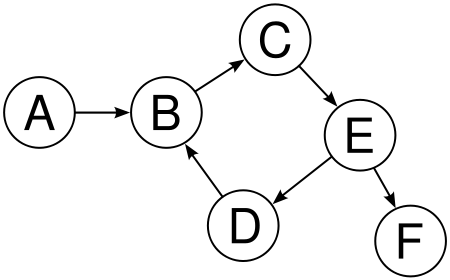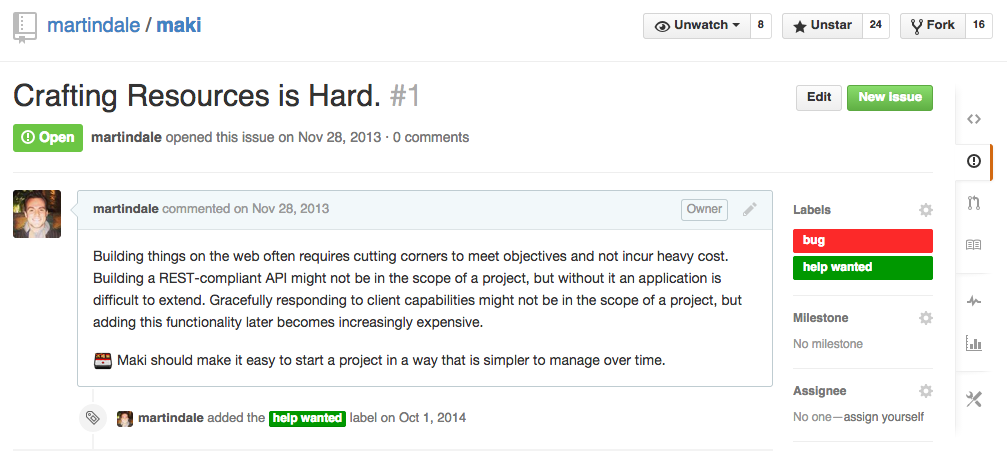
Maki
hand-rolled goodness
From Zero to MVP In Five Minutes
maki.ericmartindale.com
Resource-based architecture-as-a-library
@martindale • Atlanta NodeJS Meetup • April 9th, 2015
Why Maki?
- LocalSense, 2011 – 2013
- Startup Weekend, March 2013
- ↳ Coursefork, funded company
- ↳ Trinket:
trinket.io - soundtrack.io, May 2013 – now
- BitPay, December 2013 – now
In the beginning...
Internet !== World Wide Web
The Internet didn't really take off
...until the World Wide Web was created.
(specifically, hypertext )
<a href="location">document</a>

The Semantic Web
...is all about knowledge representation.
<abbr title="2015-04-09T21:16:37Z">
3 minutes ago
</abbr>
<a href="http://twitter.com/martindale" rel="me">
Eric on Twitter
</a>
...makes information very easy to consume.*
microformats.org
While the World Wide Web is a publishing platform,
the Internet should be a secure network of privacy-
aware applications that protect individual liberties.
HTTP is Really Cool!
| Events | WebSockets (http Upgrade header) |
| Pipelining | spdy, http/2.0 |
| Content Negotiation | Accept, Accept-Language headers |
| Methods | verbs: OPTIONS, PATCH, PUT... |
| Authentication | Basic Auth (username, password) Cryptographic (HTTP Signatures) |
The Same URI can serve many users,
but allow referencing of the same document.
and we don't need any stinkin' cookies, either.
Servers should serve resources, not applications.
what about all those client-side JS frameworks?
They're perfect for progressively enhancing a document,
but only after it has been served.
Benefits include: performance, resilience (high-latency connections), bandwidth...
...and developer ease-of-use.
Methods
| GET | to retrieve a document or collection |
| POST | to create a document in a collection |
| PUT | to create a document at a specific location |
| PATCH | to update a document at a specific location |
| DELETE | to remove a document at a specific location |
| HEAD | to retrieve a document or collection metadata |
| OPTIONS | to retrieve a list of methods a document supports in the current HTTP context (i.e., what credentials are provided in the Authorization header?) |
$ curl -H "Accept: text/html" irs.gov/returns
<!DOCTYPE html>
<html>
<head>
...
Full document including a list of returns,
and maybe some Javascript to live-update the page.
$ curl -H "Accept: application/json" irs.gov/returns
[
{
"id": 8675309,
"date": "Thu Apr 09 2015 21:48:57 GMT-0400 (EDT)",
"amount": 2753.22,
"status": "pending"
},
...
]
var ws = new WebSocket('irs.gov/returns/8675309');
ws.onmessage = function(msg) {
console.log('Resource updated.', msg );
};
$ curl -X PATCH -d "status=issued" irs.gov/returns/8675309
HTTP/2.0 200 OK
{
"id": 8675309,
"date": "Thu Apr 09 2015 21:48:57 GMT-0400 (EDT)",
"amount": 2753.22,
"status": "issued"
}
Okay, so what?
Building this for real sounds really hard.
hint: it is.
Maki


Code is craft.
Be a craftsman.
var Maki = require('maki');
var twitter = new Maki();
twitter.define('Tweet', {
attributes: {
content: { type: 'String', max: 140 }
}
});
twitter.start();
var Maki = require('maki');
var twitter = new Maki();
twitter.define('User', {
attributes: {
username: { type: String, max: 35 }
}
});
twitter.define('Tweet', {
attributes: {
content: { type: String, max: 140 },
_user: { type: twitter.mongoose.SchemaTypes.ObjectId, ref: 'User' }
}
});
twitter.start();
var Maki = require('maki');
var twitter = new Maki();
var Passport = require('maki-passport-local');
var passport = new Passport({
resource: 'User'
});
twitter.use( passport );
twitter.define('User', {
attributes: {
username: { type: String , max: 35 , slug: true },
password: { type: String , max: 200 , masked: true }
}
});
twitter.define('Tweet', {
attributes: {
content: { type: String, max: 140 },
_user: { type: twitter.mongoose.SchemaTypes.ObjectId, ref: 'User' }
}
});
twitter.start();
var Maki = require('maki');
var twitter = new Maki();
var Passport = require('maki-passport-local');
var passport = new Passport({
resource: 'User'
});
twitter.use( passport );
var User = twitter.define('User', {
attributes: {
username: { type: String , max: 35 , slug: true },
password: { type: String , max: 200 , masked: true }
}
});
var Tweet = twitter.define('Tweet', {
attributes: {
content: { type: String, max: 140 },
_user: { type: twitter.mongoose.SchemaTypes.ObjectId, ref: 'User' }
}
});
User.on('create', function(user) {
Tweet.create({
content: 'My first tweet!',
_user: user._id
}, function(err, tweet) { console.log( err || tweet ); });
});
twitter.start();
RFC 6902: JSON PATCH protocol
Atomic transformations for objects,
encoded as a standard JSON string.
var ws = new WebSocket('ws://localhost:9200/tweets'); // generic WebSocket
ws.onmessage = function( msg ) { // message handler
console.log( JSON.parse( msg.data ) ); // JSON-RPC string + Data
} //
//
{ // WebSocket Message Data
"jsonrpc": "2.0", // JSON-RPC wrapper
"method": "patch", // JSON-RPC wrapper
"params": { // JSON-RPC wrapper
"channel": "/tweets", // Maki protocol
"ops": [ // JSON PATCH
{ // JSON PATCH
"op": "add", // JSON PATCH method // JSON PATCH
"path": "/0", // DOM/XPath for JSON // JSON PATCH
"value": { // JSON PATCH
"_id": "5526d60b20aed53950ab5112", // JSON PATCH
"content": "Another fantastic example tweet." // JSON PATCH
} // JSON PATCH
} // JSON PATCH
] // JSON PATCH
} // JSON-RPC wrapper
"id": "7f7244f0-def0-11e4-af97-75fb2146fd5f" // JSON-RPC wrapper
} // WebSocket Message Data
Multiplexing
var ws = new WebSocket('ws://localhost:9200/tweets'); // generic WebSocket
ws.onmessage = function( msg ) { // message handler
console.log( JSON.parse( msg.data ) ); // JSON-RPC messages
}
ws.send({
"jsonrpc": "2.0",
"method": "subscribe",
"params": {
"channel": "/users"
}
});
 Maki
Maki
maki.ericmartindale.com
github.com/martindale/maki
eric@ericmartindale.com • @martindale
